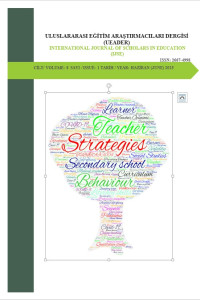Evaluation of the 2024 Human Rights, Citizenship, and Democracy Curriculum Outcomes Based on Bloom’s Taxonomy
Abstract
In Turkey, citizenship education is generally regarded as a shared outcome of multiple subjects at all levels of education. However, the most explicit course dedicated to citizenship education at the primary level is the 4th Grade Human Rights, Citizenship, and Democracy Course. Broadly speaking, citizenship education aims to cultivate "good citizens," equipping individuals with citizenship rights and responsibilities while fostering essential values and skills required by contemporary society. Over time, numerous fundamental changes have been made in the implementation of this course, leading to the development, transformation, and modification of curricula that adapt to the needs of the era. Most recently, in 2024, all curricula were restructured within the framework of the Türkiye Yüzyılı Maarif Modeli, including the Human Rights, Citizenship, and Democracy Curriculum. Although the 2018 updated curriculum is still in use, starting from the 2024-2025 academic year, 1st-grade students have begun utilizing the new curricula. Consequently, by the 2027-2028 academic year, the revised Human Rights, Citizenship, and Democracy curriculum will also come into effect.
Keywords
Human Rights Citizenship and Democracy Cognitive Process Skills Revised Bloom’s Taxonomy Learning Outcomes Primary Education.
References
- Anderson, L. W., & Krathwohl, D. R. (Eds.). (2001). A taxonomy for learning, teaching, and assessing: A revision of Bloom’s taxonomy of educational objectives. Longman.
- Benli-Özdemir, E., Yılmaz, E., & Selvi, M. (2025). Comparative analysis of the 2018 and 2024 science curricula about environmental topics based on Bloom’s taxonomy. Kastamonu Education Journal, 33(1), 35-47. https://doi.org/10.24106/kefdergi.1628228
- Bloom, B. S. (1956). Taxonomy of educational objectives: The classification of educational goals. Longman.
- Burak, D. (2017). 4. sınıf din kültürü ve ahlak bilgisi dersi öğretim programı kazanımlarının Bloom ve revize edilmiş Bloom taksonomilerine göre değerlendirilmesi. Akdeniz Eğitim Araştırmaları Dergisi, 11(21), 44-58.
- Burak, D., & Topkaya, Y. (2021). Evaluation of primary school human rights, citizenship and democracy curriculum outcomes according to Bloom and revised Bloom taxonomies. Van Yüzüncü Yıl University the Journal of Social Sciences Institute, 52, 169-192.
- Bümen, T. N. (2006). Program geliştirmede bir dönüm noktası: Yenilenmiş Bloom taksonomisi. Eğitim ve Bilim, 31(142), 3-14.
- Büyükalan Filiz, S., & Yıldırım, N. (2019). Ortaokul Türkçe dersi öğretim programı kazanımlarının revize edilmiş Bloom taksonomisine göre analizi. İlköğretim Online, 18(4), 1550-1573. https://doi.org/10.17051/ilkonline.2019.632521
- Doğan, Y., & Burak, D. (2018). 4. sınıf fen bilimleri dersi kazanımlarının revize edilmiş Bloom taksonomisine göre incelenmesi. Akdeniz Eğitim Araştırmaları Dergisi, 12(23), 34-56. https://doi.org/10.29329/mjer.2018.138.3
- Erol, T. (2021). Türkçe dersi öğretim programı kazanımlarının yenilenmiş Bloom taksonomisine göre sınıflandırılması. Ana Dili Eğitimi Dergisi, 9(4), 1421-1442. https://doi.org/10.16916/aded.937926
- Fitzpatrick, J. L., Sanders, J. R., & Worthen, B. R. (2011). Program evaluation: Alternative approaches and practical guidelines (4th ed.). Pearson.
- Forster, N. (1995). The analysis of company documentation. In C. Cassell & G. Symon (Eds.), Qualitative methods in organizational research: A practical guide (pp. 147-166). Sage Publications.
- Gökçek, T., & Korkmaz, C. (2018). Ortaokul matematik öğretim programı kazanımlarının yenilenmiş Bloom taksonomisine göre analizi. Matematik Eğitimi Araştırmaları Dergisi, 6(2), 102-120. https://doi.org/10.31464/maed.2018.652
- Gültekin, M., & Burak, D. (2019). 4. sınıf sosyal bilgiler dersi öğretim programı kazanımlarının Bloom ve revize Bloom taksonomilerine göre incelenmesi. Kilis 7 Aralık Üniversitesi Sosyal Bilimler Dergisi, 9(18), 121-140. https://doi.org/10.31834/kilissbd.597408
- Hoskins, B., & Mascherini, M. (2009). Measuring active citizenship through the development of an active citizenship composite indicator. Social Indicators Research, 90(3), 459–488.
- İneç, Z. F. (2024). İnsan hakları, vatandaşlık ve demokrasi dersi öğretim programının çocuk hakları açısından incelenmesi. T. Çalık & S. Eryılmaz (Eds.), Türk Asrı Eşiğinde Eğitim Bilimleri ve Sosyal Bilimler Üzerine Değerlendirmeler içinde (s. 58-66). Türk Eğitim-Sen Genel Merkezi Yayınları.
- Kerr, D. (1999). Citizenship education: An international comparison. International Review of Curriculum and Assessment Frameworks Archive.
- Kıncal, R. Y., & Işık, H. (2003). Vatandaşlık eğitimi ve demokratik toplum. Eğitim ve Bilim, 28(127), 71–78.
- Krathwohl, D. R. (2002). A revision of Bloom's taxonomy: An overview. Theory Into Practice, 41(4), 212-218. https://doi.org/10.1207/s15430421tip4104_2
- Milli Eğitim Bakanlığı [MEB]. (2018). İnsan hakları, yurttaşlık ve demokrasi dersi öğretim programı. MEB Yayınları.
- Milli Eğitim Bakanlığı [MEB]. (2024). İnsan hakları, yurttaşlık ve demokrasi dersi öğretim programı. MEB Yayınları.
- Oçak, İ. S., & Uzel, N. (2024). Biyoloji ders kitaplarındaki soruların ve biyoloji öğretim programı kazanımlarının yenilenmiş Bloom taksonomisine göre incelenmesi. Journal of Individual Differences in Education, 6(2), 129-148. https://doi.org/10.47156/jide.1592826
- Öztürk, M., & Demir, F. (2019). Sosyal bilgiler dersi öğretim programı kazanımlarının revize edilmiş Bloom taksonomisine göre değerlendirilmesi. Eğitim ve Bilim Dergisi, 44(198), 41-58. https://doi.org/10.15390/EB.2019.8290
- Stufflebeam, D. L., & Shinkfield, A. J. (2007). Evaluation theory, models, and applications. Jossey-Bass.
- Türkmen, H., & Dönmez, N. (2020). Lise matematik dersinde kullanılan etkinliklerin revize edilmiş Bloom taksonomisine göre değerlendirilmesi. Eğitimde Araştırmalar ve Uygulamalar Dergisi, 6(1), 75-92. https://doi.org/10.31704/eaud.2020.621
- Türkoğlu, B., & Dağlı, G. (2017). Türkiye'de vatandaşlık eğitimi ve demokratik bilinç. Journal of Social Studies Education Research, 8(3), 25–45.
- Westheimer, J., & Kahne, J. (2004). What kind of citizen? The politics of educating for democracy. American Educational Research Journal, 41(2), 237–269.
- Yaralı, D. (2024). Temel yaşam becerileri dersi öğretim programı (I-II) kazanımlarının yenilenmiş Bloom taksonomisine göre incelenmesi. EKEV Akademi Dergisi, 99, 74-98. https://doi.org/10.17753/sosekev.1499408
Details
| Primary Language | English |
|---|---|
| Subjects | Curriculum Development in Education |
| Journal Section | Articles |
| Authors | |
| Early Pub Date | April 22, 2025 |
| Publication Date | June 30, 2025 |
| Submission Date | March 11, 2025 |
| Acceptance Date | April 22, 2025 |
| Published in Issue | Year 2025 Volume: 8 Issue: 1 |
|
| |




